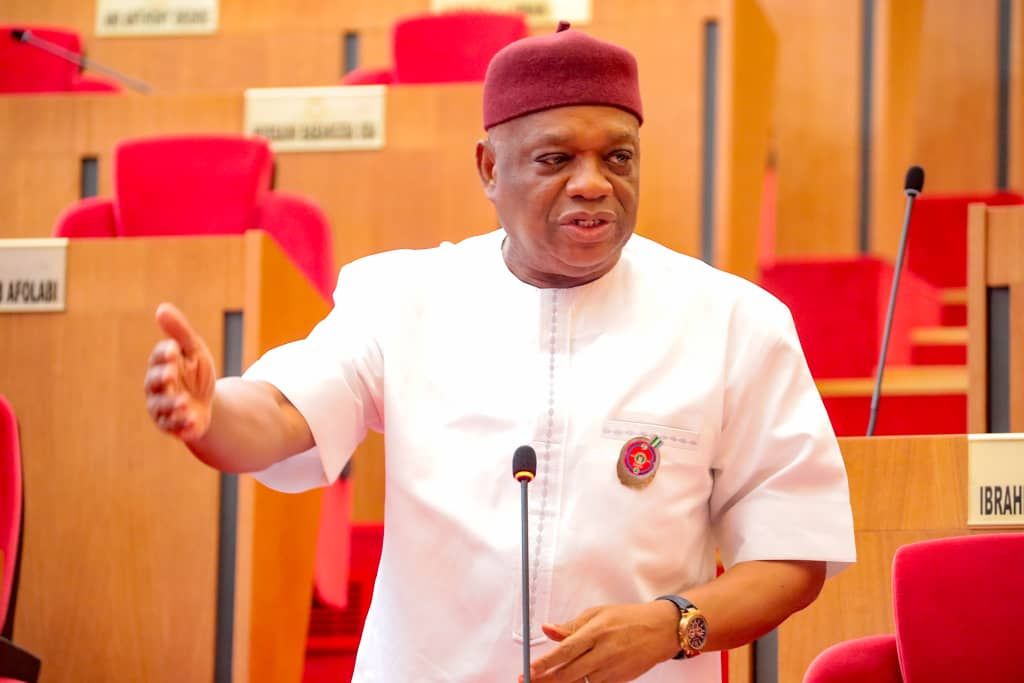
By Ranmilowo Ojalumo
Senator Orji Uzor Kalu, representing Abia North, under the banner of the All Progressives Congress (APC), has steadily carved out a reputation in the Nation’s upper chamber which many would describe as impressive. From his chairmanship role to the legislative output, he is demonstrating that effective representation and oversight in the Senate are not just lofty ambitions but practical undertakings.
One of the most important markers of Senate influence is committee chairmanship. Kalu has held key positions. He chaired the Senate Committee on Privatisation, where he steered discussions on how to reform state-owned enterprises, and more recently he was appointed chairman of the newly-created Senate Committee on the South East Development Commission (SEDC).
Being the chair of the SEDC committee is especially significant. The Commission is envisioned to catalyse infrastructure, development and restitution efforts for the South-East region. Under Kalu’s stewardship, the committee is expected to conduct oversight of the board and the policy implementation for the Commission.
His committee leadership is not just ostensible, it signals trust from his peers and gives him a platform to influence major issues. For example, on the Privatisation committee, Kalu proposed a national minimum wage of N90,000, showing willingness to press the legislature to take bold positions.
Beyond committees, Kalu’s record as a legislator is robust. Reports indicate that since becoming a Senator in 2019, he has sponsored and co-sponsored numerous bills and motions, demonstrating engagement not just with oversight but with the heart of the law-making function.
For instance, his sponsorship of motions tackling issues such as illegal gold smuggling show an appetite for substantive national reform. Moreover, his ranking among his peers is noteworthy. It is even commendable to to say, by one count, that Kalu had not less than 25 bills to his name and was rated among the most active senators from Abia State.
Meanwhile, a key measure of a senator’s “success” is how his legislative role translates to tangible benefits for his constituents. Here too, Kalu has accrued accolades: he has won, three times in a row, the Senate Press Corps Award for ‘Best Constituency Development Senator’.
His constituents have praised his efforts in rural roads, schools, solar street-lights, and human-capital development, which complement his legislative and committee work. Thus, Kalu’s model appears to combine law-making, oversight and ground-level delivery.
Several features even distinguished Kalu’s legislative style. For example, his call for part-time legislature as a cost-cutting and trust-enhancing reform. Chairing the SEDC committee places him at the heart of South-East development; his legislative agenda reflects regional concerns as well as national ones. Chairing high-impact committees gives him access to policy levers and oversight responsibilities.
No assessment would be complete without acknowledging that leadership in the Senate is complex and expectations are high. Holding a chairmanship position is one thing; delivering robust oversight, reforming institutions and ensuring laws are implemented remain harder tasks.
While having bills is useful, the quality, passage rate and implementation of such bills are equally important, these metrics may require time to fully assess. Balancing constituency development with national legislative responsibilities can stretch resources and focus; the risk is that one may detract from the other. The SEDC chairmanship is relatively newly created; the effectiveness of that body and Kalu’s leadership within it will take time to be judged.
So far, Orji Uzor Kalu’s tenure in the Red Chamber has shown clear signs of a legislator who is serious about using his mandate to better people’s life. His committee leadership provides institutional influence; his law-making record indicates engagement; and his constituency work shows responsiveness. While hurdles remain, as they always do in legislative work, the initial verdict is positive.
For his constituents in Abia North and for observers of the Senate, Kalu’s performance signals that the upper chamber can reward active engagement, that ambitious reform can be pursued, and that constituent delivery can go hand-in-hand with law-making.
If Kalu continues on this trajectory, or better still steps up implementation oversight and ensures his bills become living instruments of change, his narrative in the National Assembly may not only be “so far, so good” but “excellent, and climbing”.


